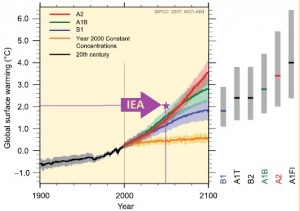Proving that there are two ways to look at any story, it has been interesting to watch the news coming out of this recent report by the International Energy Agency.
The story on the CBC, that bastion of left-wing thought, was positively glowing for the future of oil and gas. The US will be the world’s largest hydrocarbon producer by 2020, and completely energy independent by 2035. The only problem they forsee for Canada is that we will be producing so much oil and gas in Canada in the next decade that we will outstrip our ability to burn it or export it.
Few stories, however, talked about the other half of the IEA report. I pick a few relevant quotes from the Executive summary:
“Taking all new developments and policies into account, the world is still failing to put the global energy system onto a more sustainable path. Fossil fuels remain dominant in the global energy mix, supported by subsidies that amounted to $523 billion in 2011, up almost 30% on 2010 and six times more than subsidies to renewables.”
So we are pulling too much carbon out of the ground, too fast, and government policies are specifically designed to mainline this unattainable status quo, not working to fix the inherent problem with this.
What inherent problem? How about these quotes:
“Successive editions of this report have shown that the climate goal of limiting warming to 2 °C is becoming more difficult and more costly with each year that passes. No more than one-third of proven reserves of fossil fuels can be consumed prior to 2050 if the world is to achieve the 2 °C goal. Emissions correspond to a long-term average global temperature increase of 3.6 °C.”
Now compare this to the most “alarmist” of IPCC predictions, and you can see that the International Energy Agency is predicting something like twice the warming than the average of the IPCC models over the next 4 decades. Yet this part didn’t even make the news.
We can pull more carbon out of the ground that we know what to do with, and we know doing that will cause unintented catastrophe. Its like we have some kind of Obsessive Compulsive Oil Extraction Disorder.
Note – we don’t have to leave that carbon in the ground forever. The climate change thing isn’t about how much gas, oil and coal we burn, it is about the rate at which we burn it. To avoid catastrophe, we don’t need to stop using hydrocarbons, we need to slow down until the biosphere can catch up, or until we invent some sort of practical and realistic sequestration technology (which the IEA notes we are not actually inventing anywhere near fast enough). If we leave it in the ground, it will always be there. It is already so valuable for everything from plastic to chemicals to medicine that it is frankly baffling that we still waste so much of it on simple combustion – but that’s another whinge.
So we have a choice- we can rush to exploit the Bitumen Sands faster than we can burn and export it, or we can do it slowly, keep as much in the ground as long as possible, and extract more value out of every tonne of carbon extracted.
If we take the fast-and-cheap route, we will run out faster, make less per tonne, and threaten the most expensive infrastructure we have – our coastal cities (see New York and Venice). Not to mention the homes of hundreds of millions of people, and entire marginal ecosystems. Then we will leave the future generation the problem of abandoning those cities or investing massively in energy-intensive plans to save them- after we have already spent all of the easy money and burned off all of their cheap energy.
Try explaining that to your children, who I assume you hope will be alive in 2050, even after you are in the ground. That is why Anthropogenic Global Warming isn’t a science problem or a political problem, it is an ethical problem.
